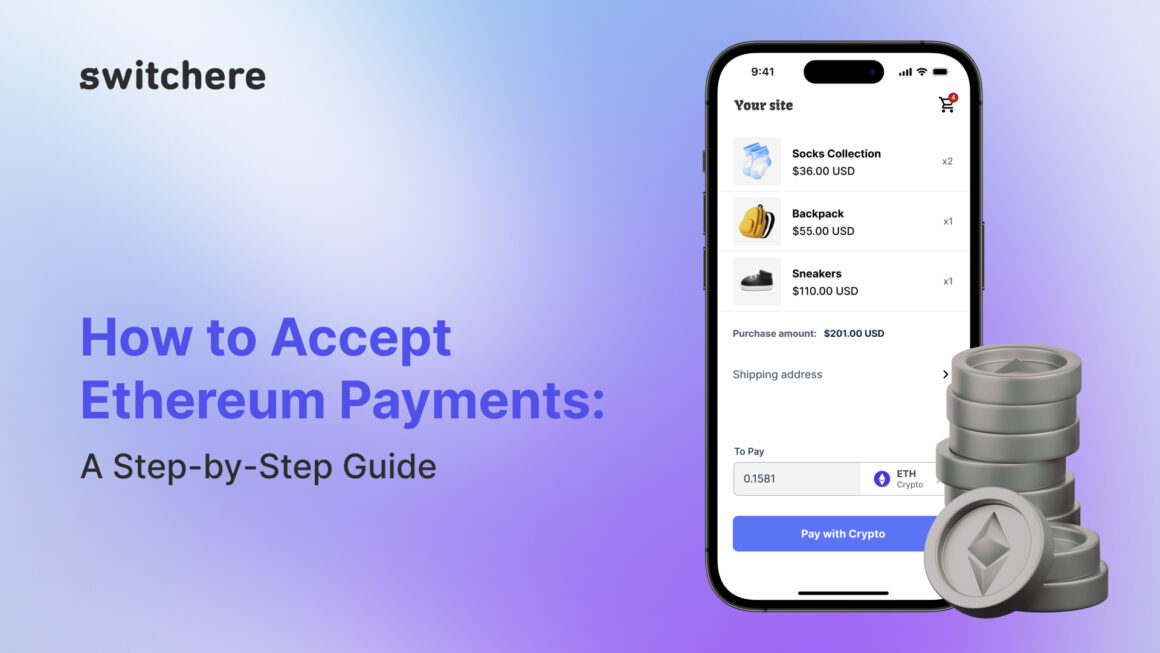Ethereum (ETH) has emerged not only as a cutting-edge and robust blockchain platform but also as a preferred means of payment for virtual currency merchants. The deployment of ETH as a payment option has witnessed a meteoric surge, with its popularity extending beyond the crypto community to mainstream fintech industries.
Let us elaborate on the key benefits of accepting ETH as payments for business entities in general and how Switchere can boost the acceptance of ETH payments for various businesses in particular.
Advantages of ETH as a Payment Option
Automatic Smart Contracts and DApps as Pillars of Innovative DLT Solutions
One of the quintessential reasons for ETH’s popularity in payments is its support for self-executing contracts and decentralized blockchain-based apps. They not only boost the payment infrastructure but also eradicate the need for unnecessary middlemen, thereby lowering company expenses and fostering first-class security measures intact.
Worldwide Coverage and International TXs
Ethereum’s global coverage is a salient dominance for merchants operating on an international scale. ETH transactions are not bound by conventional banking hours or geographical restrictions, facilitating seamless international TXs. This is particularly advantageous for online businesses catering to a global audience, letting them accept payments from customers worldwide without payment processing delays and sky-high charges that come with conventional banking institutions.
Stable and Established Ecosystem
ETH’s stability and established ecosystem facilitate its widespread acceptance. Positioned as one of the oldest and most well-recognized altcoins in the virtual currency market, Ethereum has created a powerful infrastructure, including a proactive faction of developers and a wide spectrum of DApps. Merchants are more inclined to accept ETH ascribed to its solidity, secureness and the undisputed commitment of non-stop support and innovative tools inside the altcoin’s ecosystem.
Adaptability to Fintech Solutions
The fintech line of business thrives on innovative solutions and mainstream instruments, and Ethereum’s adaptability to fintech solutions has dramatically impacted its acceptance. Merchants operating within the fintech space find value in accepting ETH to align with the technological advancements driving the industry.
Hedging Against Fiat Currency Volatility
Fintech businesses, particularly those dealing with online payments and fintech services, often face challenges associated with legal tender volatility. Accepting ETH provides a potential hedge against such volatility, as virtual currencies are known for their relatively stable value compared to some fiat funds. Merchants can mitigate monetary risk by diversifying their payment options and incorporating ETH into their accepted cryptocurrencies.
Enhanced Privacy and Lower TX Fees
ETH TXs offer first-class privacy that resonates with clients thriving for financial confidentiality. Fintech firms, always on the lookout for affordable solutions, are drawn to ETH as a perfect way to drive payment processes and cut overall TX expenses.
How to Start Accepting Ethereum Payments with Switchere?
- To start off, you can visit Switchere’s Crypto Payment Gateway page to get to know the key mechanics and workflow.
- Fill in the Contact Sales form and submit your integration application.
- Once your application is reviewed, our Sales Representative will contact you to negotiate further business partnership integration.
- For your convenience, Switchere offers such integration methods as the use of Switchere API tools, the Switchere widget, plugins, and simple ‘Pay with Crypto’ (BTC, ETH, USDT, etc.) buttons.
The Switchere partner is required to create a merchant account at the Switchere website in order to start receiving ETH payments to their merchant balance. To connect your business infrastructure with our Crypto Payment Gateway, the partner can use available partner integration tools in their merchant account.
- Try our free demo testing environment to accept ETH as payment in our sandbox.
- Go live and accept ETH payments on your website.
- Receive instant payouts in crypto to your partner wallet or in fiat to your bank account.
Conclusion
In conclusion, Ethereum’s ascendancy as a preferred payment option for crypto merchants is underpinned by its technological benefits, adaptability to fintech solutions, and blockchain-based characteristics. As the fintech sector keeps on its evolvement, Ethereum’s stance as a reliable and innovative payment option is probable for endurance, and, as a result, re-forming the future prospects of digital transactions.
